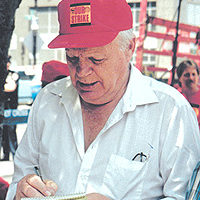CHICAGO – In a strongly worded resolution, the AFL-CIO Executive Council condemned the Bush administration’s threat to use federal troops to break any strike by members of the West Coast International Longshore and Warehouse Union (ILWU) against the shipping companies belonging to the Pacific Maritime Association (PMA).
The resolution says “the mere threat” of military intervention undermines the legitimate collective bargaining rights of the ILWU. “On a larger scale,” the resolution states, “the threatened use of federal troops to determine the outcome of a collective bargaining dispute undermines the basic civil rights of all American workers.”
Negotiations between the union and the shippers were recessed on July 21 and will resume August 13. The union has been working without a contract.
Richard Trumka, AFL-CIO secretary-treasurer and chair of the Strategic Approaches Committee, said an intervention would be “corrosive” to the collective bargaining process. “Never before has a president threatened to use military force while negotiations are under way,” Trumka said.
Bush’s intervention has been particularly felt in airline negotiations. Prior to his administration 97 percent of contract disputes were settled without White House intervention; since Bush took office, he has intervened directly or threatened to intervene in every airline contract dispute, according to Ed Wytkinde, director of the AFL-CIO Transportation Trades Department.
Although the council adopted a number of resolutions ranging from the need to overhaul the nation’s health care system to corporate accountability, the 2002 elections and the battle to elect worker-friendly majorities in both Houses of Congress overshadowed other issues at its August 5-8 meeting here.
In a wide-ranging discussion with reporters, Steve Rosenthal, the federation’s political director, said the AFL-CIO will target approximately 75 key races when its Labor 2002 campaign is officially launched at Labor Day celebrations around the country.
Rosenthal said the campaign will concentrate its efforts on 23 governorships, 12 seats in the U.S. Senate and 40 more in the House of Representatives where members of union households can make an impact in the November election.
Rosenthal, who will be leaving the AFL-CIO after the November elections, refused to make any predictions about the outcome of the elections, describing the situation as a “roller coaster with races coming in and out of play every week. We’ll have a lot of ups and downs. Like every election, there is no guarantee of success this year, but we can improve the odds.”
Rosenthal added that while the AFL-CIO will concentrate on economic issues facing working families and broader issues like preserving Social Security, prescription drugs under Medicare and education, the Bush administration and the right wing may attempt to use the war against terrorism or an invasion of Iraq as their election rallying point.
“They’ve said repeatedly that there will be new terrorist attacks,” Rosenthal said. “Will they arrest an Al Qaeda cell in Minnesota, another in Missouri and others in key states before the election?” he asked sarcastically, pointing to the fact that labor-backed Democratic incumbent Sens. Paul Wellstone (Minn.) and Jean Carnahan (Mo.) are in tight races against opponents hand-picked by the White House.
Rosenthal and other labor leaders said the economy will trump the war as the defining issue of the elections, as the tale of corporate greed and misdeed continues to unfold.
Linda Chavez-Thompson, AFL-CIO executive vice president, said, “People’s attitudes are changing because of the economic downturn. What I see creeping up into the patriotism is economic concerns.”
Rosenthal said the federation will move on two tracks this fall as it seeks to capitalize on that trend.
The first will be face-to-face contact and communication with members, a strategy first developed in the campaign against the California “paycheck deception” initiative of several years ago and honed in elections since then.
As has been the case since 1998, the unions will depend on getting its troops out on the campaign trail in the next two-and-a-half months and to the polls on Election Day. Activity will revolve around a nationwide 10-point registration and get-out-the-vote program for use by local unions.
Guest speakers at the council meeting included House Minority Leader Richard Gephardt (D-Mo.); Guy Ryder, newly elected General Secretary of the International Confederation of Trade Unions, and the Rev. Jesse Jackson, who stopped briefly to talk to reporters.
Jackson said he urged the Executive Council to “take to the streets. Where they have done that, they have made an impact and changed results as in the case of Enron workers where they collected millions of dollars in severance pay for thousand of workers.”
“Labor must begin to act – to show public resistance to the Bush administration and its policies,” Jackson told the World. “When it uses the power of its feet it attracts public attention and influences policies.” Jackson cautioned against limiting “protest to sending faxes and e-mails. When that’s the limit of protest, an organization – any organization – is acting like a paper tiger.”
Jackson credited action by the AFL-CIO in forcing Connecticut-based Stanley tools to reverse its decision to locate its headquarters in Bermuda in order to avoid taxes. “And they helped the Enron workers collect $70 million dollars more in severance pay than they would have gotten.”
The author can be reached at fgab708@aol.com









Comments